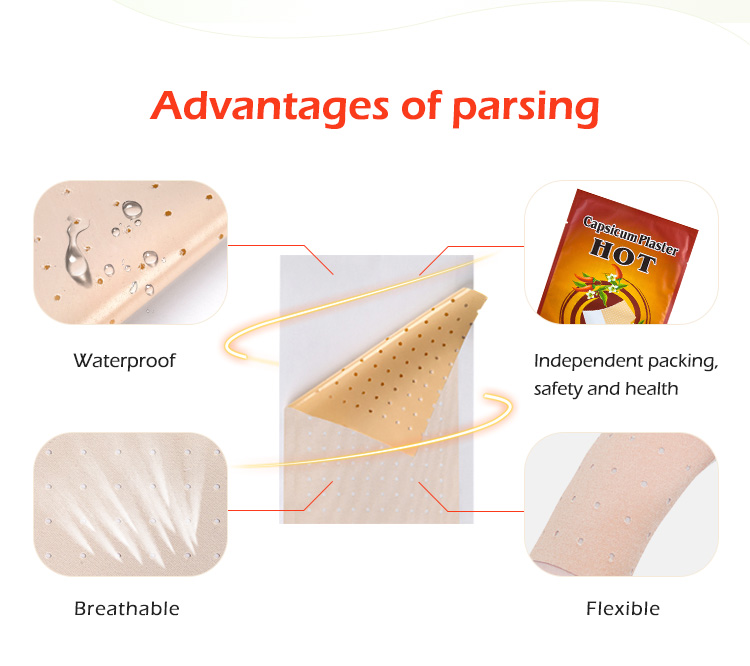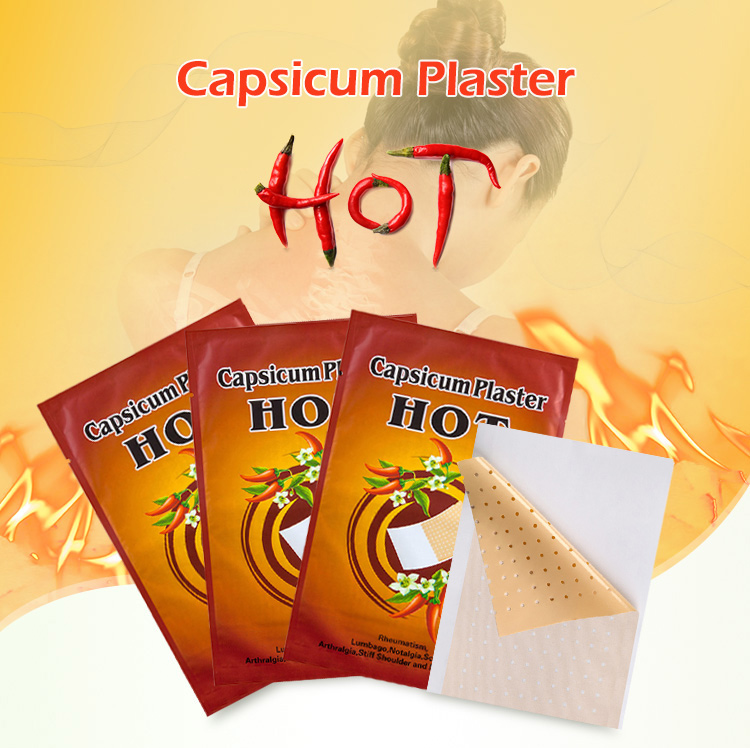Capsicum Heat Plaster OEM: Meeting Global Regulatory Standards with Ease
In today’s competitive health and wellness market, regulatory compliance is no longer just a requirement—it’s a vital component of success. For brands and businesses looking to offer effective topical pain relief solutions, aligning with a reliable Capsicum Heat Plaster OEM that can navigate the complex web of global regulations is key. Whether you're launching a Custom Capsicum Heat Plaster or building a brand through Private Label Capsicum Heat Plaster products, ensuring adherence to international standards guarantees both product efficacy and consumer trust.
This article explores how a qualified Capsicum Heat Plaster Manufacturer helps your brand meet regulatory standards with ease, elevates product quality, and strengthens your global market presence.

Understanding Global Regulatory Requirements for Capsicum Heat Plasters
Before entering the market, every Capsicum Heat Plaster Supplier must ensure the product complies with country-specific regulations. These include:
1. FDA (USA)
Capsicum plasters sold in the U.S. must comply with the FDA’s OTC (Over-the-Counter) monograph requirements, particularly those under 21 CFR Part 348. The active ingredient—capsaicin—must meet purity, safety, and concentration guidelines.
2. EMA (Europe)
The European Medicines Agency (EMA) requires a thorough review of active ingredients, product labeling, and therapeutic claims. GMP certification and toxicological assessments are essential.
3. TGA (Australia)
Products must be listed on the Australian Register of Therapeutic Goods (ARTG). Evidence of safety, efficacy, and manufacturing under GMP is mandatory.
4. CFDA (China)
China's National Medical Products Administration (NMPA) mandates clinical trial data and full documentation of ingredients for foreign medical products entering the market.
5. ASEAN Guidelines
For countries like Thailand, Malaysia, and the Philippines, compliance with the ASEAN Cosmetic Directive and relevant therapeutic claims guidelines is required.
How a Capsicum Heat Plaster OEM Partner Ensures Compliance
Partnering with a seasoned Capsicum Heat Plaster OEM ensures your products meet regulatory standards in different markets. Here’s how top OEMs make it happen:
1. GMP-Certified Manufacturing Facilities
Reputable Capsicum Heat Plaster Manufacturers operate in Good Manufacturing Practice (GMP) certified facilities, which ensures consistency, quality, and traceability of each patch. This certification is often a legal prerequisite for registration in global markets.
2. Documentation and Regulatory Dossier Preparation
OEM suppliers assist in preparing essential documentation such as:
Product Safety Reports
Ingredient Listings
Material Safety Data Sheets (MSDS)
Certificate of Analysis (COA)
Clinical Efficacy Studies
These are required during registration and audits by regulatory authorities.
3. Ingredient Traceability and Testing
All raw materials used in Custom Capsicum Heat Plasters must be traceable, ethically sourced, and tested for heavy metals, microbiological contamination, and allergens. Compliance with standards like ISO 22716 and ISO 13485 enhances credibility.
4. Labeling and Language Compliance
Each region requires specific labeling language, claims limitations, and warnings. Your Capsicum Heat Plaster Supplier will tailor packaging to meet legal criteria in each market.
The Advantages of Regulatory-Ready OEM Products
When working with a compliant Capsicum Heat Plaster OEM, you not only protect your brand but also accelerate time-to-market. Here’s why:
1. Faster Market Entry
With all regulatory paperwork in place, your Private Label Capsicum Heat Plaster can launch quicker and face fewer delays during customs or agency reviews.
2. Brand Reputation
Consumers increasingly seek transparent, safe products. Aligning with a certified OEM demonstrates professionalism and builds trust.
3. International Expansion
Compliant documentation allows your products to scale across borders without costly re-registrations or legal risks.
Choosing the Right Capsicum Heat Plaster OEM Partner
Not all OEMs are created equal. Look for the following traits when selecting your Capsicum Heat Plaster Manufacturer:
1. Regulatory Experience Across Markets
Your supplier should understand varying requirements across the U.S., EU, China, and ASEAN regions.
2. Customization Capabilities
From Custom Capsicum Heat Plasters to Private Label Capsicum Heat Plasters, choose a manufacturer that offers formulation, packaging, and branding flexibility.
3. Quality Certifications
Confirm the OEM has:
GMP Certification
ISO 9001 / ISO 22716
SGS / Intertek testing reports
COA and third-party validation
4. Transparent Communication
The best OEMs offer proactive updates, bilingual support, and detailed documentation sharing throughout your product development journey.
The Future of Compliance in the Capsicum Heat Plaster Industry
With increasing global scrutiny on product claims and ingredient safety, Capsicum Heat Plaster Suppliers must continuously update formulations and processes. Here are future-focused trends:
1. Clean Labeling
Consumers and regulators prefer minimalist, clean formulations with natural ingredients clearly disclosed on labels.
2. Smart Packaging Compliance
QR codes for traceability, tamper-proof seals, and multi-language inserts are becoming standard in global exports.
3. Sustainable Compliance
Eco-friendly packaging and sustainable sourcing are increasingly required by both consumers and regulatory frameworks.
Conclusion
Navigating regulatory landscapes can be daunting, but with a qualified Capsicum Heat Plaster OEM, your brand is positioned for global success. Whether you’re developing a Custom Capsicum Heat Plaster or launching a Private Label Capsicum Heat Plaster, regulatory compliance ensures long-term viability, customer satisfaction, and growth.
The right Capsicum Heat Plaster Manufacturer acts not only as a producer but also as a strategic partner who simplifies global compliance, enhances product integrity, and accelerates time-to-market.
Related Questions and Answers
1. Why is regulatory compliance important in Capsicum Heat Plaster OEM manufacturing?
It ensures your product can legally enter global markets, builds consumer trust, and avoids fines or product recalls.
2. What certifications should a Capsicum Heat Plaster Manufacturer have?
GMP, ISO 9001, ISO 22716, and third-party lab testing (SGS, Intertek) are essential for global compliance.
3. Can I create a Custom Capsicum Heat Plaster and still meet regulations?
Yes, a capable OEM will tailor formulations while ensuring all ingredients and claims comply with regional laws.
4. What’s the difference between Private Label and Custom Capsicum Heat Plaster OEM solutions?
Private label uses ready-made formulas with your branding, while custom solutions allow full control over ingredients and specifications.
5. How long does it take to register a Capsicum Heat Plaster in international markets?
Timeframes vary by region—from 1 month (in ASEAN) to 6–12 months (in EU or US), depending on documentation and testing needs.






